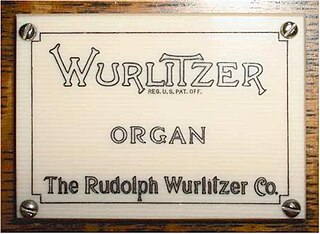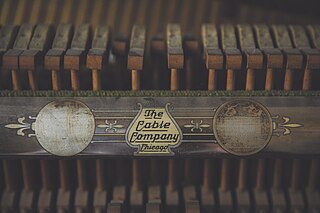
The Philadelphia Naval Shipyard was the first United States Navy shipyard and was historically important for nearly two centuries.

The Rudolph Wurlitzer Company, usually referred to as simply Wurlitzer, is an American company started in Cincinnati in 1853 by German immigrant (Franz) Rudolph Wurlitzer. The company initially imported stringed, woodwind and brass instruments from Germany for resale in the United States. Wurlitzer enjoyed initial success, largely due to defense contracts to provide musical instruments to the U.S. military. In 1880, the company began manufacturing pianos and eventually relocated to North Tonawanda, New York. It quickly expanded to make band organs, orchestrions, player pianos and pipe or theatre organs popular in theatres during the days of silent movies.
C. G. Conn Ltd., Conn Instruments or commonly just Conn, is a former American manufacturer of musical instruments incorporated in 1915. It bought the production facilities owned by Charles Gerard Conn, a major figure in early manufacture of brasswinds and saxophones in the USA. Its early business was based primarily on brass instruments, which were manufactured in Elkhart, Indiana. During the 1950s the bulk of its sales revenue shifted to electric organs. In 1969 the company was sold in bankruptcy to the Crowell-Collier-MacMillan publishing company. Conn was divested of its Elkhart production facilities in 1970, leaving remaining production in satellite facilities and contractor sources.

ACF Industries, originally the American Car and Foundry Company, is an American manufacturer of railroad rolling stock. One of its subsidiaries was once (1925–54) a manufacturer of motor coaches and trolley coaches under the brand names of (first) ACF and (later) ACF-Brill. Today, the company is known as ACF Industries LLC and is based in St. Charles, Missouri. It is owned by investor Carl Icahn.

Bendix Corporation is an American manufacturing and engineering company which, during various times in its existence, made automotive brake shoes and systems, vacuum tubes, aircraft brakes, aeronautical hydraulics and electric power systems, avionics, aircraft and automobile fuel control systems, radios, televisions and computers.

PNY Technologies, Inc., doing business as PNY, is an American manufacturer of flash memory cards, USB flash drives, solid state drives, memory upgrade modules, portable battery chargers, computer locks, cables, chargers, adapters, and consumer and professional graphics cards. The company is headquartered in Parsippany-Troy Hills, New Jersey.
American Machine and Foundry was one of the United States' largest recreational equipment companies, with diversified products as disparate as garden equipment, atomic reactors, and yachts.
Kimball International, Inc. is an American company which consists of furniture brands: Kimball, National, Interwoven, Etc., David Edward, D'Style and Kimball Hospitality. It is the successor to W.W. Kimball and Company, the world's largest piano and organ manufacturer at certain times in the 19th and 20th centuries.
The Baldwin Piano Company is an American piano brand. It was once the largest US-based manufacturer of keyboard instruments and was known by the slogan, "America's Favorite Piano". Since 2001, it has been a subsidiary of Gibson Brands, Inc. Baldwin ceased domestic production in December 2008, moving its piano manufacturing to China.
Beale Piano is a brand of pianos which was formerly manufactured in Sydney, Australia.

William Weightman was a chemical manufacturer and one of the largest landowners in the United States. Nicknamed the "Quinine King," he created a synthetic form of the drug. His company, Powers & Weightman, merged in the 1920s with the pharmaceutical giant Merck & Co. Weightman was listed as the 17th wealthiest American in history by American Heritage magazine in 1998.

The Estey Organ Company was an organ manufacturer based in Brattleboro, Vermont, founded in 1852 by Jacob Estey. At its peak, the company was one of the world's largest organ manufacturers, employed about 700 people, and sold its high-quality items as far away as Africa, Great Britain, Australia, and New Zealand. Estey built around 500,000 to 520,000 pump organs between 1846 and 1955.

The Anglecot, also known as the Potter Residence, is an historic residence in the Chestnut Hill neighborhood of Philadelphia, Pennsylvania, United States.

Newman Brothers at The Coffin Works is a museum in the Newman Brothers Coffin Furniture Factory building in the Jewellery Quarter conservation area in Birmingham, England. The museum educates visitors about the social and industrial history of the site, which operated from 1894–1998 as a coffin furniture factory. The museum opened in October 2014 after a fifteen-year campaign by the Birmingham Conservation Trust to save the factory building, which ceased trading in 1998, and raise the funds to transform it into a heritage attraction. Located at 13–15 Fleet Street, the building is Grade II* listed.
Pratt-Read is an American manufacturing company based in Sycamore, Illinois, that produces screwdrivers. It is a subsidiary of Ideal Industries. Founded in 1798, it is one of the oldest companies in the United States.

The Cable Company was an American manufacturer and distributor of pianos and reed organs that operated independently from 1880 to 1936.

The Fly Manufacturing Company Building is a historic industrial building in Shelbyville, Tennessee, that now houses the Fly Arts Center, a cultural facility. It is listed on the National Register of Historic Places.

Shawmont is a former train station in Philadelphia, Pennsylvania. It is located on Nixon Street in the Roxborough section of Lower Northwest Philadelphia. Built by the Philadelphia, Germantown and Norristown Railroad, it later became part of the Reading Railroad and ultimately SEPTA Regional Rail's R6 Norristown Line. SEPTA made the station a whistle stop and closed its waiting room in 1991. SEPTA later closed the station in 1996. In 2018, $1 million was set aside for repairs and rehabilitation.

Morrison-Electricar was a British manufacturer of milk floats and other battery electric road vehicles (BERV). Their first vehicle was built for a bakery in 1933, and the company ceased to exist when it was finally sold to M & M Electric Vehicles in 1983.












